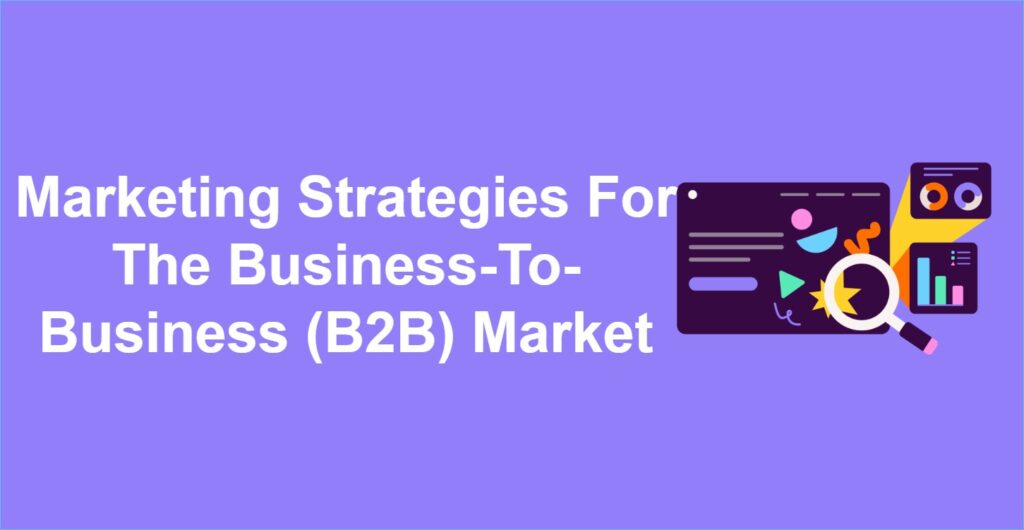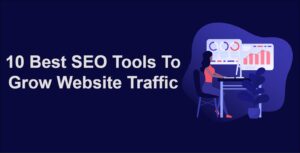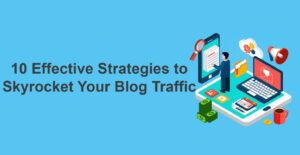What is B2B Marketing?
B2B marketing refers to the strategies that businesses use to sell products or services to other companies or organizations. Here, the customer base is also a business.
It’s primarily business-to-business marketing. And this might include marketing approaches like responsive website design, a mobile app, SEO, content marketing, email marketing, lead nurturing, social media marketing, and more.
How is B2B Marketing Done
B2B marketing is a complex and evolving field that requires an understanding of the target audience, the creation of valuable content, and the ability to adapt and refine strategies based on data and performance feedback. These key points provide a foundation for successful B2B marketing campaigns.
Here are the key points on how B2B marketing is done.
Target Audience: Identify and define the business-to-business (B2B) target audience with specific buyer personas.
Content Marketing: Create high-quality content that addresses business challenges and solutions.
Email Marketing: Use email campaigns for lead nurturing and tailored solutions.
Social Media Engagement: Build a professional online presence through industry insights and engagement.
SEO: Optimize the website and content for online visibility.
Paid Advertising: Implement targeted pay-per-click (PPC) campaigns.
Networking and Events: Connect with potential clients through industry-specific events.
Personalization: Tailor marketing efforts to individual client needs.
Account-Based Marketing (ABM): Focus on high-value accounts with customized campaigns.
Analytics and Measurement: Continuously analyze and adjust strategies based on data and performance metrics.
Marketing strategies for the business-to-business (b2b) market
Marketing in the business-to-business (B2B) market requires distinct strategies tailored to the specific nature of B2B transactions and relationships. Here are key marketing strategies for B2B:
1. Targeted Content Creation:
Develop content that addresses the unique challenges and needs of B2B customers.
Whitepapers, case studies, and in-depth industry reports can showcase expertise.
2. Thought Leadership:
Position your business as an industry leader by sharing valuable insights and expertise.
Publish articles, participate in webinars, and speak at industry events.
3. Account-Based Marketing (ABM):
Focus on high-value accounts by tailoring marketing efforts to individual clients.
Personalize content and outreach to resonate with specific businesses.
4. Networking and Relationship Building:
Foster strong relationships with key decision-makers in B2B organizations.
Attend industry events, conferences, and trade shows to connect with potential clients.
5. Trade Shows and Exhibitions:
Participate in trade shows and exhibitions relevant to your industry to showcase products and services.
This is an excellent opportunity for in-person networking.
6. Referral Programs:
Encourage satisfied B2B clients to refer your services to other businesses.
Reward referrals to incentivize advocacy.
7. Data-Driven Decision Making:
Leverage data analytics to continually measure and adjust marketing strategies.
Focus on metrics such as lead conversion rates and ROI to make informed decisions.
8. Lead Nurturing:
Implement a lead nurturing strategy to guide potential clients through the sales funnel.
Provide them with valuable content and support at every stage of the buying process.
9. Customer Testimonials and Case Studies:
Showcase success stories through customer testimonials and in-depth case studies.
Highlight how your solutions have addressed the challenges of B2B clients.
10. Segmentation and Personalization:
Segment your B2B audience based on factors like industry, company size, and needs.
Personalize marketing efforts to resonate with each segment.
11. Strategic Partnerships:
Form partnerships with complementary businesses in the B2B ecosystem.
Collaborate on joint ventures, co-marketing, or bundled solutions.
How to do B2B marketing on social media
B2B marketing on social media can be highly effective in reaching and engaging with business professionals. To successfully execute B2B social media marketing, follow these strategies:
1. Know Your Audience:
Understand your target B2B audience’s industry, roles, and pain points.
Create buyer personas to guide your content and messaging.
2. Choose the Right Platforms:
Select social media platforms where your B2B audience is active, such as LinkedIn, Twitter, and YouTube.
Focus your efforts on platforms that align with your business goals.
3. Share Valuable Content:
Share informative and educational content tailored to the needs of B2B professionals.
Content types may include industry insights, whitepapers, case studies, and webinars.
4. Engage and Interact:
Actively engage with your audience by responding to comments and messages.
Foster meaningful interactions and build relationships with potential clients and partners.
5. Measure and Optimize:
Regularly analyze the performance of your social media efforts using metrics like engagement rates and lead generation.
Use insights to refine your strategy, focusing on what works best for your B2B audience.
6. Paid Advertising:
Invest in paid social media advertising, particularly on platforms like LinkedIn.
Utilize targeting options to reach specific B2B audiences and promote your products or services effectively.
How to do B2B email marketing
1. Audience Segmentation:
Divide your B2B email list into segments based on criteria such as industry, job role, and purchase history.
Tailor email content to each segment’s specific needs and preferences.
2. Compelling Subject Lines:
Craft attention-grabbing subject lines that pique the recipient’s interest.
A well-crafted subject line can significantly improve open rates.
3. Personalization:
Personalize emails with the recipient’s name and other relevant details.
Address their pain points and offer tailored solutions in the email body.
4. Valuable Content:
Provide valuable and informative content that addresses B2B challenges and offers solutions.
Content types may include case studies, whitepapers, industry reports, and webinars.
5. Clear Call to Action (CTA):
Include a clear and compelling CTA that directs recipients on the desired action, such as downloading a resource, requesting a demo, or making a purchase.
6. Testing and Optimization:
Continuously test and optimize your email campaigns.
Experiment with different email formats, sending times, and subject lines to improve open and click-through rates.
B2B email marketing relies on audience segmentation, personalization, and valuable content to engage and convert recipients effectively. Clear CTAs and ongoing testing help refine your email strategy for better results.
How to make a B2B Marketing Plan
The foundation of a successful B2B marketing plan ensures that your efforts are data-driven, goal-oriented, and tailored to your specific B2B audience and industry.
Market Research and Analysis:
Conduct comprehensive market research to understand your B2B target audience and industry. For example, if you’re a software company targeting B2B clients, research industry trends, competitors, and the specific software needs of businesses in your target market.
Clear Objectives and Goals:
Define specific and measurable objectives for your B2B marketing plan. For instance, if your goal is lead generation, set a target number of qualified leads within a specified timeframe.
Target Audience and Buyer Personas:
Identify your ideal B2B clients and create detailed buyer personas. For example, if you’re a marketing agency, create personas for marketing managers, CEOs, and IT directors, highlighting their unique pain points and challenges.
Marketing Channels and Strategies:
Select the most effective marketing channels to reach your B2B audience. If you’re a B2B e-commerce platform, use content marketing to create guides on e-commerce best practices, email marketing to nurture leads, and SEO to increase visibility in relevant search results.
Content Strategy and Distribution:
Plan a content strategy that aligns with your objectives and target audience. If you’re a financial software provider, create content such as case studies showcasing how your software improved financial processes for B2B clients.
Budget Allocation and Measurement:
Allocate your budget to various marketing activities and channels. For example, if you’re a B2B SaaS company, allocate your budget to paid advertising on platforms like LinkedIn. Use analytics tools to measure the performance of these ads and track metrics like click-through and conversion rates to assess their effectiveness.
How to do B2B market research
Through thorough B2B market research, you gain valuable insights that enable you to make informed decisions and tailor your strategies to meet your target audience’s and industry’s specific needs and challenges.
1. Industry Analysis:
Conduct a comprehensive analysis of the industry in which you operate. For instance, if you’re in the B2B cloud computing sector, research the latest trends, emerging technologies, and the competitive landscape.
2. Competitor Analysis:
Analyze your competitors to understand their strengths, weaknesses, and market positioning. For example, if you’re a B2B marketing agency, study competing agencies’ strategies and client portfolios.
3. Target Audience Profiling:
Profile your B2B target audience to identify their industry, roles, pain points, and goals. If you provide HR software to businesses, create profiles for HR managers, CEOs, and CFOs, focusing on their HR software needs.
4. Market Segmentation:
Segment the B2B market based on criteria like industry, company size, and location. For instance, if you’re a B2B e-commerce platform, segment your market into small e-commerce businesses, mid-sized retailers, and enterprise clients.
5. Trend Analysis:
Monitor industry trends and emerging technologies that may impact your B2B market. If you’re a cybersecurity solution provider, keep a close watch on cybersecurity threats and regulatory changes affecting businesses.
6. Customer Feedback and Surveys:
Collect feedback from your existing B2B customers through surveys or interviews. If you’re a B2B software company, ask clients for feedback on your product’s features and usability to improve your offerings.
B2B Marketing Automation
B2B marketing automation allows companies to facilitate marketing tasks and role responsibilities through workflows and triggers.
B2B marketing automation helps configure the sales cycle and map out the lead journey so that your team stays productive and efficient while nurturing the leads. plus, Get the messaging right at each step in the workflow and monitor them regularly
Furthermore, Marketing automation facilitates looking for ways to optimize your workflows for better engagement.





